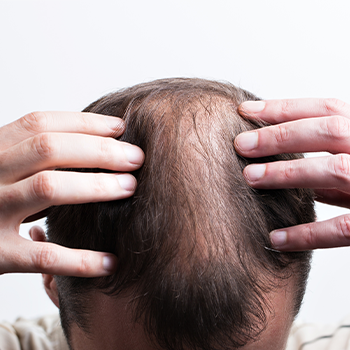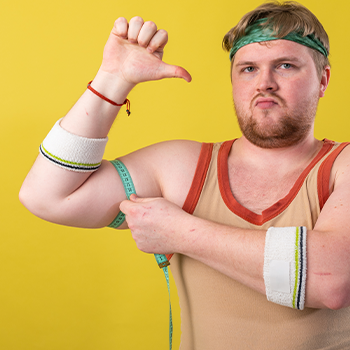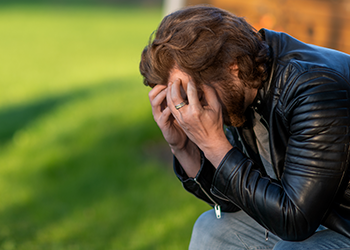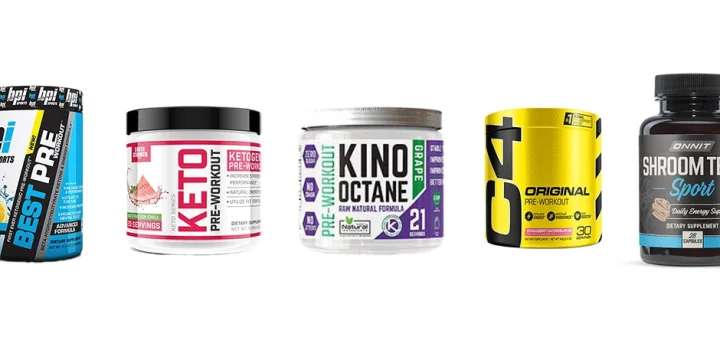That’s a question that I’ve been asked every time I talk to clients about low T-levels and the impacts on their health.
The thing is that most people have a completely wrong idea about the male sex hormone.
It’s not just about maintaining an erection and bodybuilder-style muscle growth.
Low testosterone levels can impact many other parts of your mind and body, and understanding what to look out for is a key part of overcoming and avoiding many health problems.
So, to help you better understand the symptoms, we’ve listed the following advice.
Quick Summary
9 Symptoms Of Low Testosterone Levels
1. Low Sex Drive
Men often shy away from discussing it, but low testosterone significantly impacts sex drive and fertility, which is crucial for couples trying to conceive.
2. Hair Loss

Testosterone affects hair growth. Balding, particularly in men in their 30s, may be linked to low testosterone, not just aging, as Harvard Medical School suggests [1].
Related: Do Bald Men Have More Testosterone?
3. Fatigue
More than just feeling tired at the gym, low testosterone can cause constant, severe fatigue and a noticeable drop in motivation and concentration.
4. Loss Of Muscle And Bone Mass

Low testosterone increases the risk of bone loss and affects muscle strength, as noted in the Clinical Interventions in Aging journal [2].
It's essential for bone and muscle health, beyond just minerals and vitamins.
5. Sudden Weight Fluctuations
In severe cases, testosterone deficiency syndrome can be a major contributor to obesity.
According to the Urology Care Foundation, about 30% of overweight men and 25% of men with Type 2 diabetes have low testosterone [3].
Related Articles:
6. Mood Swings

Low or fluctuating testosterone levels can cause irritability, depression, and anxiety. Early recognition of these changes is crucial for mental health.
7. Lack Of Focus
Testosterone is linked to brain function and mental focus. Treating low testosterone often leads to improved focus and energy levels, enhancing cognitive performance and vitality, as stated in the Journal of the American Medical Association [4].
8. Difficulty With Memory

Memory issues are often mistakenly attributed to aging. However, addressing low testosterone can maintain and enhance brain function.
9. Erectile Dysfunction
Low testosterone affects sperm production and sexual function, reducing nitric oxide production and thereby impacting blood flow to the penis.
“The typical signs that your testosterone may be low are commonly overlooked or mistaken for other issues which are then dealt with individually rather than as a whole. For instance, hair loss, weight gain, and fatigue are all signs of low testosterone but are often treated as individual problems."
- Lisa Richards, CNC at TheCandidaDiet.com
How To Know if You Need a Testosterone Booster?
In order to know if you need a testosterone booster, you should consider consulting a healthcare professional, especially if you're experiencing symptoms such as decreased libido, fatigue, muscle weakness, depression, or other hormonal imbalance indicators.
A medical evaluation, including blood tests, is necessary to determine if you have low testosterone levels and whether a testosterone booster is appropriate for you.
Medical Tests To Determine Low Testosterone

From my coaching experience, I've seen that if these symptoms worsen with age, simple blood tests are crucial to confirm low testosterone.
According to the Cleveland Clinic, testosterone levels peak in the morning and decline throughout the day, which is a crucial factor when testing [5].
If the blood test shows extremely low testosterone levels, doctors may suggest testosterone replacement therapy (TRT).
Total Blood Testosterone Level
This measures both free and bound testosterone, indicating your body's overall testosterone production.
It's crucial to assess free testosterone to determine if your body isn't effectively utilizing the hormone.
Free Testosterone Level
Also known as serum testosterone, this is the hormone freely available for bodily functions. It's critical for muscle building and strength development.
A low free testosterone level could explain symptoms like low libido and mood swings
TRT boosts testosterone to a normal range, easing low testosterone symptoms. It comes in various forms, like transdermal gels, injections, and pellets, each with specific application methods.
However, as a health coach, I stress that TRT needs careful monitoring by a healthcare professional.

FAQs
Does Fasting Affect Testosterone Levels?
Yes, fasting may affect testosterone levels. Longer fasting times that last several days could lead to low testosterone. At the same time, short intermittent fasting may actually improve your low T-count.
Can Low Testosterone Cause Dizziness?
Low testosterone can cause dizziness and feeling lightheaded, and it is one of the symptoms people look out for. One of the reasons that testosterone deficiency can lead to dizziness is due to a link with anemia. The other contributing factors can be sleep apnea and disturbed sleep patterns.
Can Low Testosterone Make You Feel Cold?
Yes, low testosterone can make you feel cold. Low testosterone leads to high estrogen hormone levels that reduce body temperature by sending signals to the hypothalamus, making you cold.
Does Low Testosterone Make You Angry?
Yes, low testosterone levels can sometimes make you angry. This is because testosterone influences many physical and psychological aspects of health, and fluctuations in hormone levels can impact mood and emotional state.
Can Low Testosterone Cause Migraines?
Yes, low testosterone can cause migraines. Low testosterone is linked to migraines as hormonal imbalance causes estrogen levels to rise, resulting in common episodic cluster headache disorders.
Can Low Testosterone Make You Emotional?
Yes, low testosterone can make you emotional, as testosterone is a neuroactive steroid that impacts the central nervous system. Thus, a drop in this hormone can cause physical and emotional symptoms like anxiety and depression.
How to Test Testosterone at Home?
To test testosterone at home, order a test kit, take a sample, activate the test process, send the sample to the lab, and finally wait for the results.
Can Low Testosterone Cause Night Sweats?
Yes, low testosterone can cause night sweats. Similar to how hormonal imbalances during menopause can lead to hot flashes in women, low testosterone in men can result in night sweats.
Can Low Testosterone Cause Brain Fog?
Yes, low testosterone can cause brain fog because this hormone can stimulate electrical activity in the brain by activating certain cortical networks. Balancing T levels can alleviate difficulties with concentration and mental clarity.
Is There a Connection Between Low Testosterone and Immune System?
Yes, there is a connection between low testosterone and the immune system. When levels are either too low or too high, it seems to weaken the intensity of the immune response.
Can Low Testosterone Cause Diabetes?
Low testosterone might cause type 2 diabetes in men. This is because testosterone plays a role in how the body manages insulin and glucose. However, it's important to note that this relationship is complex, and other factors like obesity, lifestyle, and overall health also significantly contribute to the risk of diabetes.
Can Low Testosterone Cause Anxiety?
Yes, low testosterone can cause anxiety. Testosterone plays a role in regulating mood and mental health, and a deficiency can impact emotional state and psychological well-being.
References:
- https://www.health.harvard.edu/mens-health/testosterone-prostate-cancer-and-balding-is-there-a-link-thefamilyhealth-guide
- https://www.ncbi.nlm.nih.gov/pmc/articles/PMC5036835/
- https://www.urologyhealth.org/urology-a-z/l/low-testosterone
- https://www.ncbi.nlm.nih.gov/pmc/articles/PMC5433758/
- https://my.clevelandclinic.org/health/diseases/15603-low-testosterone-male-hypogonadism
About The Author
You May Also Like







I’ve been experiencing some of these symptoms, especially fatigue and irritability. Is it possible to have low testosterone even if you don’t have erectile dysfunction?